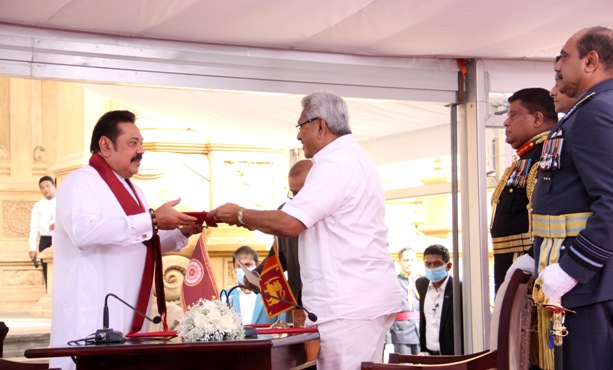
President Gotabaya Rajapaksa (R) Mahinda Rajapaksa (L) extend traditional greetings after Mahinda Rajapaksa is sworn is as Sri Lanka’s new Prime Minister – J. Sujeewakumar/ENCL
COLOMBO – Former President Mahinda Rajapaksa was sworn in as Sri Lankan’s prime minister for the fourth time after his party, the Sri Lanka Podujana Peramuna (SLPP), secured a landslide victory in parliamentary elections that cemented his family’s hold on power.
Mahinda Rajapaksa took oath today (9) before his younger brother, President Gotabaya Rajapaksa, at the prominent Kelaniya Rajamaha Vihara Temple, on the outskirts of Colombo. Members of the diplomatic community, legislators from the ruling and opposition parties and his family were among the large gathering witnessing the historic event.
Mahinda served as Sri Lanka’s president from 2005 to 2015 and is highly popular among the ethnic majority Sinhalese for ending the 25-year civil war with the Tamil rebels in 2009.
He was first elected prime minister in 2004 and again appointed for a brief and controversial 52 days in 2018 and 2019.
The SLPP or the Sri Lanka People’s Front won 145 seats in the 225-member Parliament in an election held under strict Covid related health guidelines on Wednesday (5).
Its main opponent, the Samagi Jana Balawegaya (SJB), the breakaway faction of the United National Party (UNP) led by Sjith Premadsa, obtained 54 seats. A party representing ethnic minority Tamils won 10 seats, and 16 others were split among 12 small parties. The UNP led by former prime minister Ranil Wickremesinghe suffered a crushing defeat, managing to secure only one bonus seat on the aggregate count.
The victory brought the Rajapaksa brothers very close to the two-thirds majority required to make constitutional changes that could strengthen dynastic rule in the country.
Five members of the Rajapaksa family have been elected as MPs.
In addition to the PM, his son Namal, the eldest brother Chamal and his son Sashindra, and a nephew, Nipuna Ranawaka, will be in Parliament.
The brothers need 150 seats to be able to change the Constitution. At least four small parties collaborate with the Rajapaksas’ party, so they appear to have mustered that support.
Sri Lanka had been ruled by powerful executive presidents since 1978. However, a 2015 constitutional amendment strengthened the Parliament and prime minister and put independent commissions in charge of judiciary appointments, police, public services and the conduct of elections.
Gotabaya was elected president last November after projecting himself as the only leader who could secure the country after the bombings of churches and hotels on Easter Sunday in 2019 that killed 269 people.
However, Mahinda is unlikely to cede any of his powers as he works on promoting his son Namal as heir.
Namal and three other members of the family are likely to control key functions in the new administration.
The landslide victory also raises fears of weakening government institutions such as independent commissions.
Mahinda’s new cabinet is set to take oaths later this week and the new Parliament is set to convene on August 20.
–ENCL/Agencies








